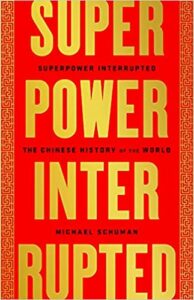A new U.S.-China Digital World Order Initiative will emphasize the need for “digital democracy” to triumph over “digital autocracy,” according to reports.
China thinks American democracy is too messy to win the digital competition online, but the U.S. can succeed, said Valerie Shen, vice president for national security at the Third Way center-left think tank.
“The U.S. will need to dig deep, figure out, agree upon and then execute our own plan to win,” Ms. Shen told a forum at the International Spy Museum in Washington, D.C., today (above). “The whole of government, big tech, businesses, civil society, and, yes, even Democrats and Republicans passing laws together.”
The best way to counter China’s sharp power efforts in the Middle East is for the US to raise its diplomatic and economic game, argues Minxin Pei, Professor of Government at Claremont McKenna College.
This means, first and foremost, abandoning the effort to frame strategic competition with China and Russia as an ideological contest between democracy and autocracy, he writes for Project Syndicate. After all, the vast majority of Middle Eastern countries are autocracies. The last thing the US needs is to alienate them with an overtly ideological foreign policy that enables China to portray itself as a more reliable, supportive, and like-minded partner, adds Pei, a National Endowment for Democracy (NED) board member.
Two Chinese human rights activists are set to face grossly unfair trials behind closed doors this week after being targeted and tortured due to their peaceful work, Amnesty International said today. Legal scholar Xu Zhiyong and human rights lawyer Ding Jiaxi will be in court this Wednesday and Thursday respectively, facing spurious charges of “subverting state power”.
The Chinese government’s goal is clear when it comes to its surveillance capabilities, The Times’s Visual Investigations team reports: designing a system to maximize what the state can find out about a person’s identity, activities and social connections, which could ultimately help the government maintain its authoritarian rule. RTWT
 A big test for China’s system of collective governance may be looming, notes Michael Schuman, the author of Superpower Interrupted: The Chinese History of the World and The Miracle: The Epic Story of Asia’s Quest for Wealth.
A big test for China’s system of collective governance may be looming, notes Michael Schuman, the author of Superpower Interrupted: The Chinese History of the World and The Miracle: The Epic Story of Asia’s Quest for Wealth.
Xi Jinping has undermined a once-meritocratic and pragmatic governance system by capturing control over policy and sidelining what little opposition existed within the party, he writes for The Atlantic.
He “has worked hard and been successful to shape decision-making processes around his person,” Nis Grünberg, the lead analyst at the Mercator Institute for China Studies, recently noted. “Following party policy now essentially means for all party officials to follow Xi’s lead.”
Xi’s over-centralized rule is proving why advocates of democracy believe authoritarian regimes ultimately fail, Schuman adds. Communist China was a basket case under one-man rule. It could be again.
“Xi has established a new model of the foreign-policy decision-making process that is focused on his sole authority,” Yun Sun, a senior fellow at the Stimson Center, recently explained. “Xi, his strategic personality, and his foreign-policy vision are the fundamental origin of China’s foreign-policy behavior today,” and thus “the assertiveness and coerciveness manifested are the direct result of Xi’s political beliefs and the system he has designed to enforce his vision.”
The regime has tweaked some rules to try to stabilize an emerging economic crisis, writes Bloomberg analyst Enda Curran. For example the central bank stepped up its support for several distressed developers and banks were instructed to ensure growth in both residential mortgages and loans to developers in some areas. Above all, avoiding a “Lehman moment” — when the failure of the US bank in 2008 sent shock waves through global markets — is a priority ahead of this year’s Communist Party congress, where Xi is expected to be handed a third term.
Contesting what @ThinkDemocracy calls #China‘s #sharppower means abandoning the effort to frame strategic competition with China and Russia as an ideological contest between democracy & autocracy, @NEDemocracy board member @MPEI2014 writes for @ProSyn https://t.co/lmYZpZUTPl
— Democracy Digest (@demdigest) June 21, 2022








